UNICEF works to 'protect childhood' as one in two Ukrainian children now displaced and 7.5 million 'at risk'
From playgrounds to air raids, a life of war is what many Ukrainian children are growing accustomed to one month on from the Russian invasion.
For those born in bomb shelters, this will be the only life they know for a long time yet.
Advertisement
Hide AdAdvertisement
Hide AdChildhood has taken on a tragic and warped meaning in Ukraine. From terrified little girls sharing bunkers with rats, to women – after finding out they are pregnant during a war – living in fear for the lives of their babies. All joy has been replaced with the uncertainty and sadness towards a wasted current and future childhood for Ukrainian children.
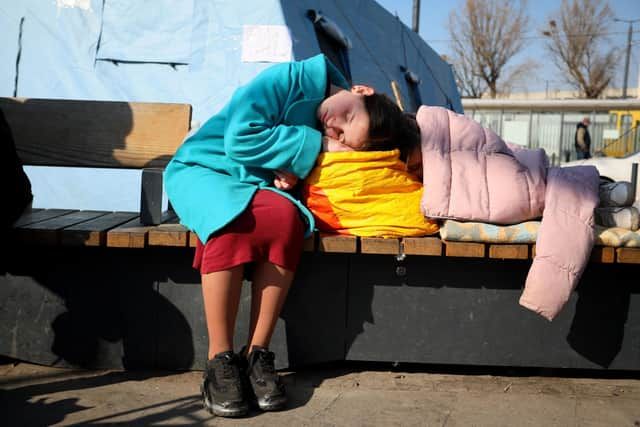

One in two Ukrainian children (4.3 million) have now been displaced and the whole child population (7.5 million) is “at risk”, latest figures from the United Nations (UN) reveal.
Every minute, 55 Ukrainian children flee their country. To put this into context, a Ukrainian child has become a refugee almost every second since the start of the war.
Yet out of the 4.3 million Ukrainian children displaced, a majority of these remain in Ukraine (2.5 million) while more than 1.8 million have crossed into neighbouring countries as refugees.
"These numbers are mind-boggling and every one of them wears the face of a child who’s suddenly often under bombardment, had to flee their home and leave everything behind,” says James Elder, a UNICEF aid worker who has been based in the western city of Lviv for a month now.
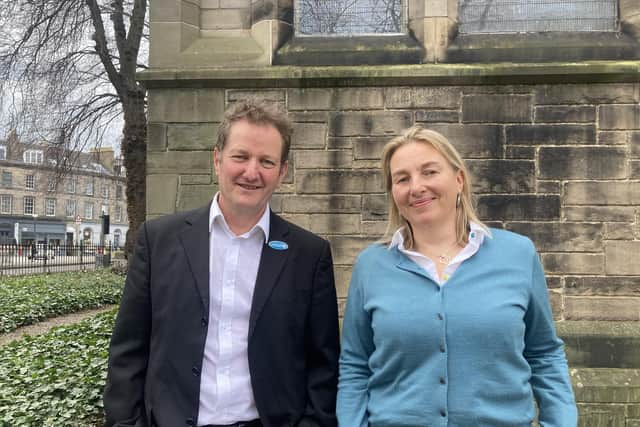

James spends roughly eight hours a day either at a train station in the city, helping families with what they are going through, or at hospitals and makeshift maternity wards speaking with paediatricians.
“There’s still a sense of fear and disbelief towards the absolute horror of what daily life has become,” James tells me. "It’s sad and sorrowful to see how doctors are having to function and see what mothers are having to experience.
"As you can imagine, there hasn’t been a good day in this war for Ukrainians."
Advertisement
Hide AdAdvertisement
Hide AdHe is calling me from Ukraine, the phone line at times crackling and faint, and nothing can soften the blows as I hear of the traumatic stories involving children he has met.
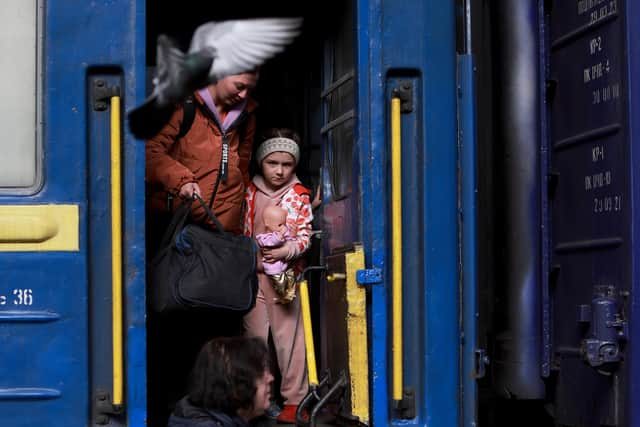

"People have lost everything and, like someone said to me, it’s like a cyclone that doesn’t stop,” he says. "A boy was trapped under a car after a landmine hit it and he watched his mother die and a father was crying over his dead two-year-old son.”
The 15-year-old boy who lost his mum had been fleeing an area north of Kyiv – another city under fleet bombardment.
James says he does not know what happened to the boy, or for how long he was left under the car, but it is instances like this that strike terror into the hearts of Ukrainians.
“I’ve spoken to a mother who told me she often lay across her children, not for warmth, but for protection if there were bombs and shrapnel,” he says. "There’s times at the train station when everywhere you turn there are tears because it’s farewells – this place is just soaked in sorrow.”
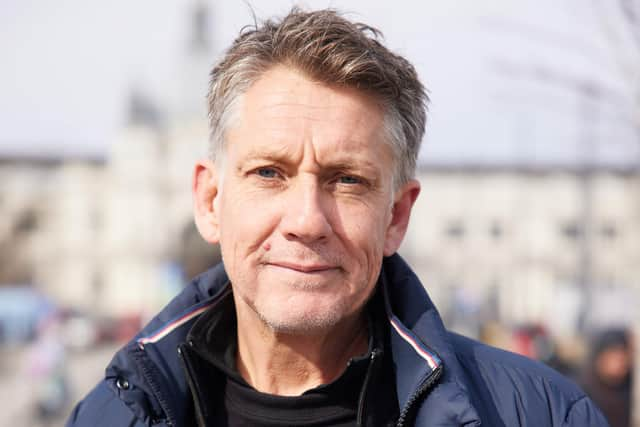

Yet, James says often there are no tears on the faces of children, just shock and bewilderment as a crisis unfolds around them.
"You will see children, some ten hours in a queue trying to get into Poland when it was freezing cold weeks ago, not crying at all. But that’s a sign of trauma not a well-behaved child.
"Others are holding onto their parents’ legs not wanting dad to go.”
Advertisement
Hide AdAdvertisement
Hide AdJames also spoke of the difficulties parents face; a mum sitting with her eight-year-old daughter trying to explain why dad is somewhere else, or a parent comforting a child who has lost a loved one.
Despite the devastation, Ukrainian parents have been creative and brave in the pictures of war they paint for their children.
James tells me of a mum, Nadia, who tells her daughter, Jaryna, that bombs are fireworks and running to bunkers is a game.
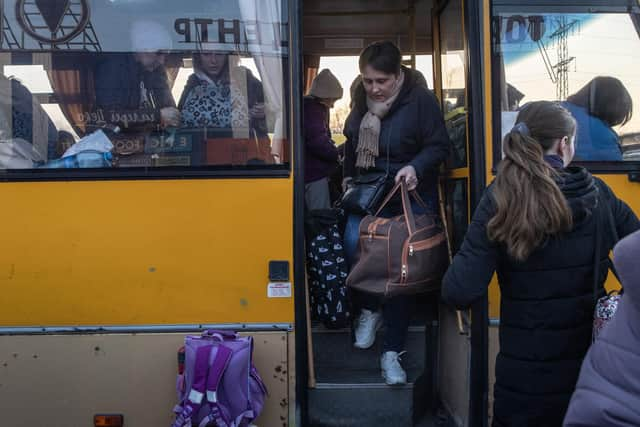

Every step of the way, Nadia protects her daughter, physically and psychologically as best she can.
“The girl was so dynamic and it was just one of those rare moments of joy in the day which was great,” says James. "But her mum pulled us aside separately and explained that she hadn’t heard from her husband all day and he was in the military under bombardment. Her sister who is too sick to leave had just called and their school had been bombed.
"She was terrified.”
But some parents cannot shield their children as the terrors of war become all consuming.
James says: “Some are spending night after night in a bunker, or a basement which is freezing cold, with the sounds of war outside and there’s no hiding that reality from kids.”
And then there are some parents who can no longer cope.
“Some children are comforting their parents as I’ve seen children whose mums have just cracked,” he tells me. “Despite all the incredible bravery and buffering they do to try to protect their children, sometimes they will just break down.”
Advertisement
Hide AdAdvertisement
Hide AdThe UNICEF worker says he witnessed a nine-year-old girl telling her mum it “would be okay” as she sat crying on the streets of Lviv.
"This is just beautiful, but the mum of course knows it is not okay."
During our call, I can hear flutes and children crying in the background. Music has often been used as a means to comfort those in crisis, but not much can penetrate the grief and trauma children are facing.
James takes breaks from our call to talk to children, search for a phone signal and also move to safety. He is constantly on the go, to tell other people’s stories and offer them aid.
He has been involved in UNICEF since the Angolan Civil War ended in 2002. He has worked in Zimbabwe, Somalia, Libya, Yemen and Ethiopia to help those in need, yet something about Ukraine is different, he tells me: not on a human level, but on sheer size and scale.
"It’s very difficult to compare. When you look at a situation like Yemen where around 10,000 children were killed or maimed, there was day-to-day horror,” he says.
"Ukraine is slightly different in the speed which everything has occurred. It’s the swiftest damage in terms of speed and scale. We’ve not seen anything like this since World War II, so it’s hard for anyone in living memory to recount.
"All these events have shocked me and this one is no different. No one was expecting the extent on the attacks here, so it has made it more difficult.”
Advertisement
Hide AdAdvertisement
Hide AdJames says he has not seen anything on the ground yet to suggest the war and the devastation it brings will end any time soon.
“I’m not going anywhere now so let’s see how it all pans out. For the foreseeable future, I’m here.”
As a father-of-three, James says witnessing crises involving children has always taken on a deeper level for him – and this time is no different.
“I’ve been patently aware of the lottery of my own birth and our responsibility to do more,” he says.
"My eldest is 20, so from the day I joined UNICEF I had a newborn. I was in Africa seeing mothers cope without clean water and the threat of malaria and then thinking my own child was not there.”
Asked if his own children worry about his safety, James says: "I tend to speak more about the people I’ve encountered and the heroic things they are going through, rather than my own situation, to give them a sense of what’s happening and help them not to worry.”
***
James is one of over 140 UNICEF workers based across Ukraine, most of whom are Ukrainians experiencing their own trauma but helping others deal with theirs.
Many are working more than 14 hours a day looking after children and then going to look after their own .
Advertisement
Hide AdAdvertisement
Hide Ad"We are all absolutely blown away by their dedication and commitment to do the right thing,” says Lucinda Rivers head of UNICEF Scotland as we meet in Edinburgh to discuss the agency’s response to the war. "They are putting themselves in really serious danger. We’ve been working in eastern Ukraine for eight years so we understand the context well – and so our colleagues are there still.”
UNICEF is acting as it always does in the face of a humanitarian crisis: providing families with access to clean water and food as well as delivering lifesaving supplies to support those who have been forced to flee.
The agency is also working closely with local health facilities to ensure they have the supplies needed and it is helping to make sure child protection services continue.
In neighbouring countries, UNICEF has delivered 26 “blue dot” safe spaces which will provide care and support, information to families seeking refuge, psychosocial help, water and sanitation supplies, safe spaces for mothers and children, protection for unaccompanied and separated children and more.
The support UNICEF provides is not simply transitory and practical, it is also about trying to protect a childhood.
Jon Sparkes, UNICEF UK executive director, tells me: "It’s not only memories of war and seeing your parents under rubble, it’s also memories of being a child.
"It takes someone like UNICEF to create that multi-disciplinary support and to do it at scale.
"It’s about children having a moment to be a child again, where they get a moment to play and be safe for a short while,” Ms Rivers adds. “Then we will make a note of them and as they move along the transit route we will be able to keep track of them and make sure they remain safe.”
Advertisement
Hide AdAdvertisement
Hide AdLearning from past humanitarian crises experiences, Mr Sparkes says the blue dot centres have evolved into a “joined up” approach.
"That’s a big learning that not only are you supporting people in one place, but by definition if they are on the move, you’ve got to be supporting them in the next place.”
There are 85 UNICEF trucks – with approximately 850 tonnes of medical equipment and food – currently on their way to Ukraine.
Since the start of the war, it has ordered 40 million dollars worth of medical equipment and food - enough to support over 1.1 million children.
However, increased support is needed if UNICEF is to help more people and it is currently appealing for £260 million.
"UNICEF is very well equipped to deal with this,” says Ms Rivers. “We did it 11 years ago and we are still doing it after Syria where over 13 million people were displaced – half of whom were children.
"We have a massive amount of experience in dealing with this and we work very closely with governments to ensure the policies are putting the best interests of the child at the centre of everything.”
If the £260 million figure is reached, that will still not be the end of the organisation’s funding efforts, as more will be needed as the crisis grows.
Advertisement
Hide AdAdvertisement
Hide Ad"It won’t be that when we reach that number everything is fine, it will reach that number and more resource is needed,” says Mr Sparkes. "We are still working with the consequences of Syria 11 years on, we are still dealing with Yemen and the issues in Afghanistan and all of these things will continue for many, many years.”
Comparing Ukraine to other crises UNICEF has worked in, Mr Sparkes says: “At a human level, you can say it is the same.
"We are talking about children under attack, children displaced from their homes frightened and traumatised, we are talking about children leaving their country for who knows how long.”
Talking about children still in Ukraine without a home, Mr Sparkes adds: "They will be witnessing bomb alerts, they will be having to rush down into an underground shelter and witnessing bomb attacks.
"It’s horrific for the children who remain, but obviously they have moved from their homes to keep as safe as possible.”
The Scottish Government has given £1 million in humanitarian assistance to UNICEF which Mr Sparkes says has been “very quick and very generous” but more is “always needed”.
Asked whether the UK government’s decision to not waive visas for refugees impacts UNICEF’s response, he says: “Supporting people to move quickly is really important and you can see government taking steps to help support people.
"I guess a cynic might call some of that bureaucracy, but I think it’s about making sure people are safe and making sure we set those systems up properly. But that is the conundrum for government.”
Advertisement
Hide AdAdvertisement
Hide AdAs children face significant risks, Mr Sparkes says the number one thing children need right now is peace.
“If it’s three things, it’s peace, immediate humanitarian support and supporting their ongoing well-being.”
***
In Scotland, many people feel hopeless as we watch the devastation in Ukraine unfold in front of us. However, there is action we can take, according to UNICEF.
"The number one thing is money and sometimes people don’t like to hear that, but it is the quickest most sustained way we can get the support to people where they need it and when they need it,” says Mr Sparkes, as he thanks all those who have given to the organisation so far.
Ms Rivers adds: “The Scottish people are incredibly generous and we are super grateful to everybody who’s donated, but we need to get these supplies now and if we have money we can get that into eastern Europe in two or three days, which will allow us to buy supplies to get into Ukraine really fast.”
Scottish actor Ewan McGregor is also getting behind UNICEF’s efforts as Ms Rivers mentions he is launching an appeal video to draw attention to the vital work it is doing and to encourage people to donate.
On Thursday, Hampden Park welcomed Poland’s football team to play a friendly against Scotland in order to raise funds for the organisation. It comes as Scotland should have been hosting Ukraine in a fixture that has now been postponed until June at the earliest.
After attending the event in Glasgow, Ms Rivers says a rough estimate of funds raised through the partnership with the Scottish Football Association have been £375,000.
Advertisement
Hide AdAdvertisement
Hide AdMr Sparkes says community efforts through sport, such as football, can play an important part in fundraising efforts for UNICEF.
"It brings people together and it brings communities together – and it’s a real force for good.”
More information on the UNICEF UK appeal can be found here: https://www.unicef.org.uk/donate/donate-now-to-protect-children-in-ukraine/
A message from the Editor:
Thank you for reading this article. We're more reliant on your support than ever as the shift in consumer habits brought about by coronavirus impacts our advertisers.
If you haven't already, please consider supporting our trusted, fact-checked journalism by taking out a digital subscription.
Comments
Want to join the conversation? Please or to comment on this article.